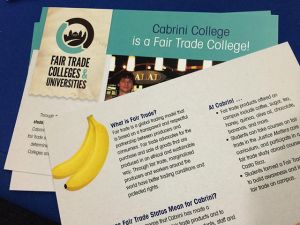Just a year after Cabrini College started a fair trade club, it was declared the seventeenth college in the United States to be a fair trade school in December of 2013.

The fair trade committee was formed about eight years ago and since then, has been a full effort from the entire Cabrini community.
Chairman and associate professor in the business department and adviser for the fair trade club, Dr. Erin McLaughlin believes that the commitment and dedication from students and other Cabrini and community members is why the petition to be declared a fair trade institution, was so successful.
“Along with the help from the students, we had to really get support from the entire community, so that meant faculty, staff, administrators, students most importantly,” McLaughlin said. “Not only those individuals but also partners that we have on campus like Sodexo, eFollet; they were integral in helping us obtain that status without whom it would not have been possible.”
Now that Cabrini is a fair trade school, what is happening with it, now what?
Sophomore communication majors and co-chairs of the fair trade club, Emily Janis and Jill Nawoyski are extremely excited to be a part of something so prestigious.
“The feeling was wonderful to be declared as part of something so rare and unique to our community,” Janis said. “Fair trade is a huge commitment and a wonderful way to turn the world around. Being a part of something this important feels great and can really pull together people in the community to show our support isn’t just wonderful for the school, but as well as [for] the students.”
Being fair trade is a very noble thing in our society today because of how difficult and extensive it is to become declared.
“Fair trade is very important to the Cabrini community,” Tom Southard, administrator of community partnerships in the Wolfington Center, said.
“It is very important from everything that we do, with our social justice aspect. It is not that everything is fair trade here, we don’t have the ability to live up to that right now but it does allow us to ensure that we can trace where our products come from.”
The school received a shared grant in 2012 with St. Joseph’s University to jumpstart the declaration process from Catholic Relief Services.
“Fair trade is a social justice movement,” McLaughlin said. “[It is] intended to build awareness around those that are marginalized and the poor that are in the world today.”
Particularly in developing nations, where there are individuals working as farmers or artisans who are not able to engage in free market systems the way the rich are, working in fair trade is a healthy, just and peaceful alternative for them. Working for fair trade companies provides opportunities for those who are constantly struggling with working in a healthy environment with fair wages, while providing education and an infrastructure.
Fair trade is in our curriculum even though it is not that apparent. There are an abundance of classes that have fair trade aspects. Even on our campus, the bananas and chocolate we eat, the coffee, tea, sugar and honey we consume and the clothing we purchase from the bookstore, are mostly fair trade.
“I’m not a zealot for telling people how they should shop, where they should shop and why they should shop, I think it’s all about educating,” McLaughlin said. “Really having people understand, what impact it actually does and what it actually means to those individuals that are trying to survive. It’s just up to me to educate and raise awareness.”



